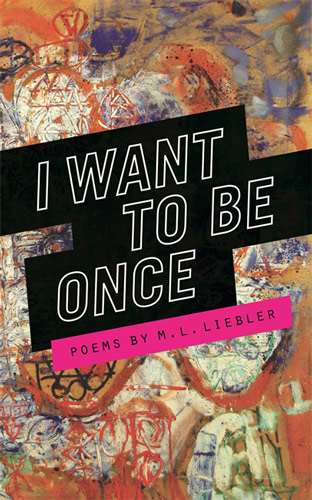I Want to Be Once
A friend of mine said Google killed the revolutionary. The 99% feel rich. We’re numb and fat. I have access to everything I could ever want. As a matter of fact, my imagination no longer seems as vast as the possibilities created by the internet. However, M.L. Liebler confronts this notion a bit. It is a nudge of awakening. In a generation of Americans with infinite privilege, poverty isn’t even true poverty. He has seen the revolutions in Detroit and the raging in the desert on the other side of the planet. I Want to Be Once has the heart of a sage bringing wisdom to those without experience. While I may be stuck behind my computer, living a life of privilege and low conceit, seeking out only those things pertinent to me, Liebler delivers the news of reality and a slant to go along with it. The revolution is in the letter. A friend of mine said Google killed the revolutionary. The 99% feel rich. We’re numb and fat. I have access to everything I could ever want. As a matter of fact, my imagination no longer seems as vast as the possibilities created by the internet. However, M.L. Liebler confronts this notion a bit. It is a nudge of awakening. In a generation of Americans with infinite privilege, poverty isn’t even true poverty. He has seen the revolutions in Detroit and the raging in the desert on the other side of the planet. I Want to Be Once has the heart of a sage bringing wisdom to those without experience. While I may be stuck behind my computer, living a life of privilege and low conceit, seeking out only those things pertinent to me, Liebler delivers the news of reality and a slant to go along with it. The revolution is in the letter.
I Want to Be Once is divided into three parts in a manner of rhetoric. The first section is titled “American Life.” It dissects the politics of 1960s Detroit. The opening poem “Underneath My American Face” is an homage to Liebler’s ‘gramps,’ but it has even more in common with Wayne State Alum and modern classic, Philip Levine:
Gramps, I sometimes wondered
What your life could possibly have been
With the exact same breakfast every day at 530 a.m.:
Two fried eggs, bacon, toast, and coffee with condensed milk.
This is the life of the machine, the routine and the industrial. Post World War II America and its quest for money and progress created gears out of people. As the middle class and highway system grew, the plight of those uninvolved in the growth spurt became obvious. Less obvious was the toll of becoming one with the machine. While Diego Rivera seemed in touch upon this idea, it wasn’t prominent in the culture of the team. Liebler takes a perspective that is very grand. He wonders at his gramps’s diligence, seemingly armed with the postmodern knowledge that Rivera provided, but at the end he concludes with admiration: “A Life / Well lived, / Complete.”
The second section in Liebler’s work is titled “American War” and takes place where all the wars take place: not America. We are congruent with our nonrevolution even in the midst of war. The most amazing piece is how little we know behind the headlines. We are so wrapped up in our own Google queries that we have no time for consuming foreign knowledge. But here again, Liebler reaches through this problem to an insight that is complex, but digested with simplicity. In “Vacant Chair” Liebler states, “This is the new America.”
An explosion
That leaves nothing
Standing in its wake.All we ever wanted
Was a little cornerOf this world to raise
Our families, and to praise our God,
The dichotomy becomes clear. We live in a global village. At one point, those who are now in America desired something better, something else. The purging of war seems to be the only. Liebler has a compassion akin to Gary Snyder writing about Obligate Seeders, those plants that need the wildfire to release the seeds held within.
Not everything is that beautiful though. “Further On Up The Dusty Afghan Road” takes the reader back to the blinders. The poem mentions that after ‘handshakes, hugs and inspirational words’ the ‘School director will likely be executed for collaborating with Americans’. The poem then finishes with: “I was told // Not to concern myself / With that.”
This is a great segue to the third and final section, “American Psalms,” a great satire of our modern time and the writer’s personal life. It is such a privilege to remain ignorant and let the great world spin. Liebler pokes fun at some of the problems we expose while our head is down in the sand. “American Psalm: Which Side Are You On?” details the gruesome facts about beheadings and executions that are filmed and shared. When Americans lazily reply that they are against the war, Liebler asks, do you even know who you are aiding? This forces the reader to research and learn something for themselves.
Alas, the metaphor of Liebler’s grandfather’s dementia is probably the most poignant of all. In “American Psalm: The Thanksgiving Dinner Blues,” gramps begins complaining about race and “bitchin ‘bout Welfare Queens” and he then states that he wants his country back: “. . .but his dementia / Is advancing, so all he says is, // Well, well, I sure as hell want something.”
Ain’t that the truth.
::Siri, open browser::





